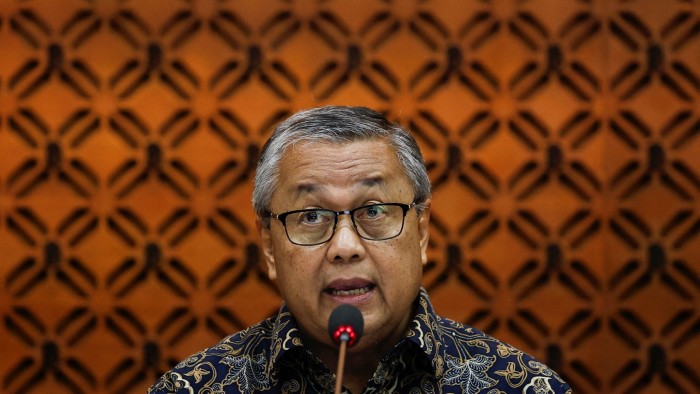Unlock the Editor’s Digest for free
Roula Khalaf, Editor of the FT, selects her favourite stories in this weekly newsletter.
Indonesia’s central bank has unexpectedly cut interest rates despite a weakening rupiah, citing slowing growth momentum in south-east Asia’s largest economy.
Bank Indonesia on Wednesday reduced its benchmark interest rate by 0.25 percentage points to 5.75 per cent, in just its third cut in four years. Economists polled by Reuters and Bloomberg had unanimously expected the central bank to hold rates.
The bank previously lowered rates in September, but had since kept them steady, citing the need to support the rupiah, which has fallen 8 per cent against the dollar since September.
BI governor Perry Warjiyo said the rate cut was consistent with a low inflation forecast for this year and “the need for efforts to encourage economic growth”.
He also slightly lowered Indonesia’s 2025 growth forecast, citing weaker exports, consumption and private investment.
“By cutting the [interest] rate, it shows a change in our stance which is towards pro-stability and growth,” he said in a briefing.
Warjiyo added that the central bank would “continue to look for any room for interest rate cuts, in accordance with global and national dynamics”. He said factors that influenced the bank’s decision included movements from the US Federal Reserve, which is expected to slow its pace of rate cuts, and the direction of the national and global economies.
The rupiah, which has already been weakening against a stronger US dollar, fell to a six-month low following the announcement.
The central bank’s move underscored a focus on improving economic performance in Indonesia, whose vast nickel reserves have made the country a critical player in the global supply chain for stainless steel and electric vehicles.
It also comes just three months after President Prabowo Subianto took office with an ambitious goal of boosting growth to 8 per cent in the next five years. Indonesia has been growing at a steady rate of 5 per cent over the previous decade, except for during the Covid pandemic.
According to most recent government data, the economy expanded 4.95 per cent in the third quarter of 2024, the slowest growth rate in a year.
On Wednesday, the central bank said 2024 growth would be slightly below the midpoint of its earlier forecast of 4.7 to 5.5 per cent. It also trimmed this year’s growth forecast to a range of 4.7 to 5.5 per cent, from a previous forecast of 4.8 to 5.6 per cent.
Inflation in December came in at 1.57 per cent on the previous year, at the lower end of the central bank’s target annual range of 1.5 to 3.5 per cent.
The weaker growth prospects come as the rupiah, along with other emerging market currencies such as the South Korean won, Thai baht and Brazilian real, has been losing ground against a stronger dollar as the US central bank has recalibrated its rate outlook.
The rupiah is currently trading below a landmark level of Rs16,000 to the dollar, and the central bank has intervened repeatedly in recent weeks to support the currency.
OCBC senior Asean economist Lavanya Venkateswaran said Bank Indonesia could cut rates by another 0.25 percentage points this year.
“BI’s tone was decidedly more dovish . . . with a clearer emphasis on supporting economic growth. With BI’s priority having clearly shifted to growth, the follow through rate cuts could come sooner rather than later,” she said.
Source link









